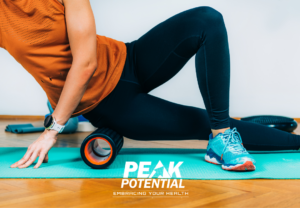What you eat matters to your general health, athletic performance, and physical therapy recovery plan. That’s why the first step in our wellness coaching program is to keep a food diary. In reviewing this information with numerous clients, protein is the most often goal missed on a daily basis.
Some people have used an internet search to identify their protein needs and are concerned about getting too much protein. The fact is, that unless you have kidney disease, seizures disorders, or specific types of cancer this will not be a problem.
Proteins make up about half of each of the cells in your muscles, organs, tendons, nerves, bone, and skin. They are building blocks of these structures and also contribute to the production of hormones.
If strong muscles and bones, healthy aging, stable mood, hormone balance, and maintaining a healthy body weight are important to you then protein must be a priority.
Wondering if you are getting enough protein or if you need to be a little more intentional?
Let’s discuss 6 circumstances where focusing more on protein could dramatically improve your health and quality of life.
-
Maintain a Healthy Body Weight
Consider the thermic effect of food. The digestion of protein burns about 30 calories for every 100 consumed. Compare that to 7 calories per 100 calories for carbohydrates and you can can see how protein consumption actually helps boost your metabolism.
In addition, protein is effective at promoting a feeling of fullness. That means you can manage your appetite better and not feel hungry all day.
-
Build Lean Muscle
The protein we eat is broken down into amino acids in the digestive system and amino acids are the building block of muscle. Adequate protein is necessary to fuel strength training exercise and to actually see results from your efforts in the gym.
-
Follow a Vegetarian Diet
You can get all the protein you need without consuming animal products, but you have to be more intentional. A single plant based protein does not contain all the essential amino acids that your body needs.
Eating a wide variety of plant based proteins will ensure you meet your basic requirements. Good sources include beans, lentils, quinoa, and many vegetables. If using vegan protein powder, be sure it contains several different sources (the one I use contains hemp, pea, quinoa, and chia protein) so you get all the essential amino acids your body needs.
-
Have a Healthy Baby
One life event that dramatically increases your protein needs is childbirth. Women who are pregnant or breastfeeding need more protein to meet the needs of their body and a growing baby. The higher quality protein source the better – choose grass fed beef, organic chicken, free range eggs, sprouted nuts and seeds.
Talk with your doctor or nutrition specialist about your individual needs. This is especially important if food aversions or nausea are limiting your intake.
-
Recover from an Injury or Illness
During injury rehabilitation we are trying to repair injured tissue – muscle, nerves, fascia, tendons and ligaments – and the primary role of protein in the body is to repair tissue.
In addition, protein is important to maintaining strength and muscle mass during periods of inactivity due to injury or illness. The type and timing of protein may be most important in this case with collagen protein being more important in bone and tendon injury, while whey protein has the most evidence for assisting in muscle repair.
-
Age Well
Over the age of 35, two things start to happen. First, your body starts to break down muscle faster than it is built unless you intervene with resistance training. You can assist this process of “muscle synthesis” by consuming the protein needed to rebuild.
At the same time, your body has increased difficulty breaking down and absorbing protein that it now desperately needs. This means that you actually absorb less of the protein you consume. Increasing protein quantity, improving protein quality, and utilizing digestive enzymes to support the break down of amino acids can be beneficial.
There are too many health benefits of proteins – anything from a stronger immune system to healthier hair – to review them all. Can we agree it’s worth looking at where we stand on protein in order to optimize our health?
Interested in a free review of your current protein intake and how to best utilize protein to meet your current goals. Click the link below to speak with our Certified Nutrition Specialist during a Free Wellness Discovery Session (options for in person, virtual sessions, or simply answer questions via email).




